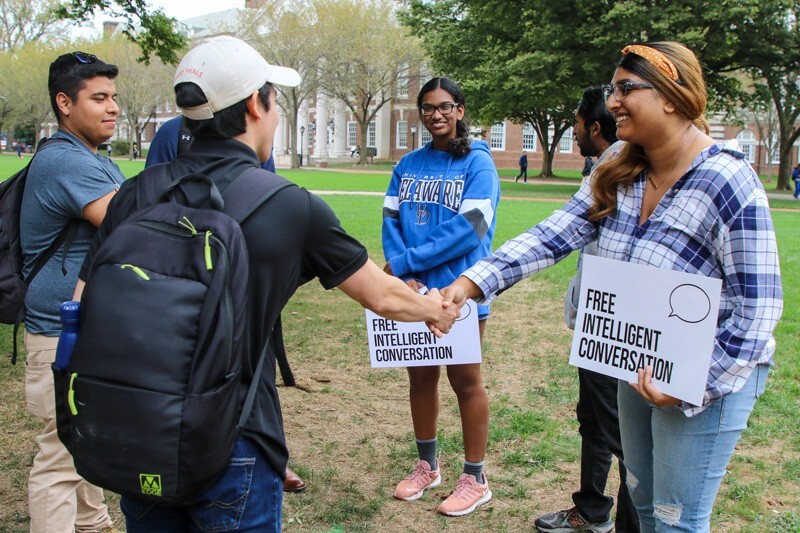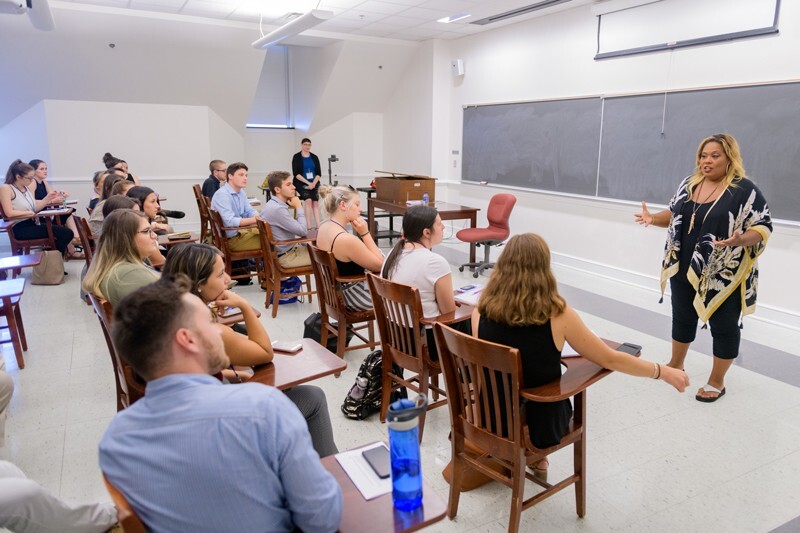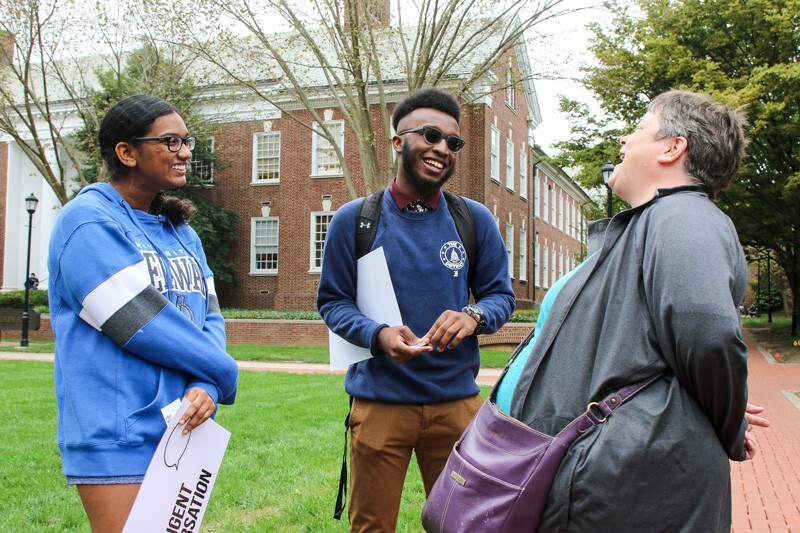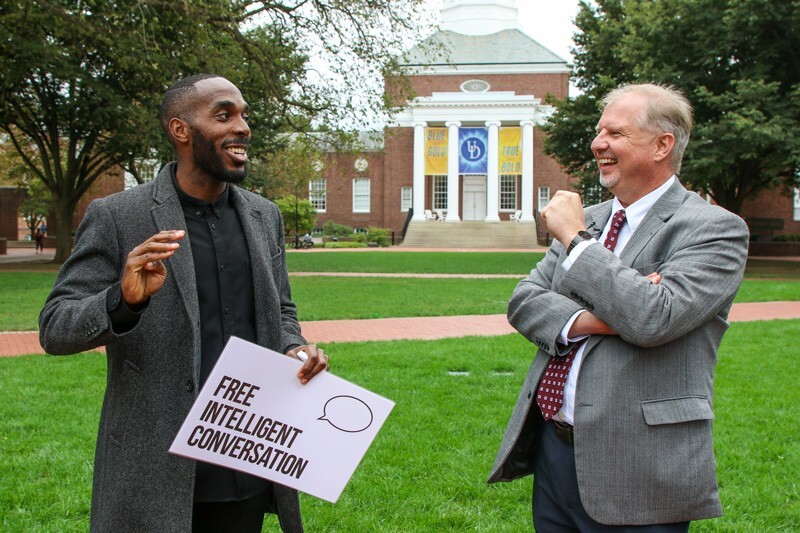national agenda students : Can we talk?
National Agenda class offers students a unique experience

Each fall, the University of Delaware’s National Agenda series brings prominent speakers to campus to share their insights into current political issues with the UD community and the public.
For the audiences that pack Mitchell Hall during these talks, the series is an exceptional opportunity to hear firsthand accounts from political insiders, authors, journalists and activists.
But for UD undergraduates who enroll in the associated course, National Agenda is even more.
“We get to interact with all these speakers, and what’s amazing is that they come to our class and talk to us and are usually very open in what they say,” said Olivia Feldman, a junior political science major who took the course last fall and found it so valuable that she signed on to be the teaching assistant this year.
“And then they answer our questions and seem to really listen to us and care about our opinions.”

National Agenda, which is hosted by UD’s Center for Political Communication (CPC), has been offered annually since 2010. This year’s theme, “Direction Democracy,” explores where we have been, where we are going and the current state of democracy in America.
Students meet the speakers in their classroom and at dinner before each public talk. They also undertake some group projects, which this year has resulted in their participation in a national movement known as Free Intelligent Conversation (FreeIC), which encourages meaningful dialogue between strangers.
Students working on the project can be seen on The Green or in Trabant University Center holding “Free Intelligent Conversation? signs and a stack of cards that provide a conversation-starting question. (For example, “What do you hate that you wish you loved??)
FreeIC was just one of the group projects from which students could choose this year, but it turned out to be the most popular, said Lindsay Hoffman, who directs National Agenda and teaches the class. Its mission of interpersonal engagement and civil discourse is a perfect fit for the goals of the class, she said.

“National Agenda is an immersive experience for the students,” said Hoffman, who is an associate professor of communication and associate director of the CPC.
“In their interactions with the speakers and guests, they”re actually doing what they”ve been learning to do – how to interact with people from different backgrounds. The best experience comes when a speaker turns out not to fit the stereotype the students may have had of that person.”
Speakers are carefully selected to be a diverse group in terms of their political and cultural backgrounds and views, Hoffman said. She also sees the class as something of a life-skills learning experience where young adults can develop their ability to talk with others in a respectful way but without being intimidated.
Students say that’s what they have found in the class.
Sansskruty Rayavarapu, a junior majoring in political science, said she especially appreciated the chance to speak with Tara Setmayer, a CNN political commentator and former GOP communications director, who met with students before her talk on Oct. 2. Although she didn’t agree with Setmayer’s conservative perspective, she said she was impressed with their interactions.
“She put such a big emphasis on listening to people,” Rayavarapu said. “It really allowed me to see a different perspective.”
Student Jagger McFarland agreed, saying, “It’s a different way of hearing what people have to say when you”re in the same room with them.”
For Hoffman, the class is not just about discussing political issues but also helping students to develop the skills they”ll need throughout life as they interact with others.
“My goal is to make students active citizens who respect other people – even if they have different opinions – and to be engaged in the world,” she said.
Free Intelligent Conversation

National Agenda students who chose the FreeIC initiative as their group project this semester have taken the ball and enthusiastically run with it, not only seeking out strangers to engage in conversation but also planning to continue the effort through a new registered student organization called Let’s Talk.
Free Intelligent Conversation is a national nonprofit organization founded by Kyle Emile, who said that we all need to talk to strangers more than ever.
In 2013, as an undergraduate psychology student, he set out to prove that, just by holding a sign in a public place, anyone can create meaningful dialogue between strangers. He and a group of friends began the project in Chicago, where the response to the signs was large, diverse and overwhelmingly positive, and the organization has been expanding ever since.
In October, Emile visited UD to speak with the National Agenda and Let’s Talk students on campus who were regularly standing on The Green with their signs offering a “Free Intelligent Conversation? to interested passers-by.
The objectives of the movement include celebrating each other’s differences, creating places where people can talk about anything and encouraging meaningful, face-to-face conversations.
At UD, although the project came about through National Agenda, the conversations aren’t generally political.
“We talk about any subject,” said Rayavarapu, who is serving as president of the new RSO. “It sometimes becomes political, but that’s not the goal. The goal is to engage with each other.”
The National Agenda students are not only inviting and participating in these conversations but also conducting research for the class project. Through the use of a questionnaire, they hope to measure the levels of engagement that occur under various circumstances.
Up next for National Agenda
National Agenda continues its “Direction Democracy? theme with its final two 2019 speakers.
Former New Jersey Gov. Chris Christie, a 1984 UD alumnus of the College of Arts and Sciences, spoke Nov. 6 on “Deciphering Political Power.” A former federal prosecutor, Christie is the author of a new book, Let Me Finish: Trump, the Kushners, Bannon, New Jersey, and the Power of In-Your-Face Politics. Learn more about his National Agenda talk in this UDaily article.
The speaker series will conclude on Wednesday, Nov. 20, when John Della Volpe, director of polling at the Harvard Kennedy School Institute of Politics, will speak on “Measuring Millennials.” He is the founder of SocialSphere, a public opinion and analytics company, and frequently appears on national media outlets.
His talk begins at 7:30 p.m. in Mitchell Hall and, like all events in this series, is free and open to the public. Registration, at this website, is optional but recommended for Della Volpe’s appearance.
Article by Ann Manser; photos by Andre Smith and Evan Krape; video by Paul Puglisi and Jason Hinmon
Published Nov. 8, 2019
